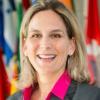
This year, the institute celebrates 30 years of Ukraine’s IIASA membership – a period marked by many impactful research partnerships in forestry, agriculture, water resource management, and energy, among others. Amid the challenges posed by the ongoing conflict in the country, IIASA is proud to highlight some of its achievements and joint projects with Ukrainian scientists.
Ukraine became a member of IIASA in 1994 with the National Academy of Sciences of Ukraine assuming the role of the Ukrainian National Member Organization. Since then, Ukraine and IIASA have forged strong research partnerships yielding a variety of major accomplishments.
Research cooperation between the institute and Ukraine spans over a variety of areas, including forestry, agriculture, water resource management, and energy. Since the start of the ongoing war in 2022, IIASA scientists have analyzed the repercussions of the conflict, extending beyond the loss of human life. The most significant achievements of the recent years include: calculating greenhouse gas emissions resulting from wartime activities; analyzing socio-demographic characteristics and the return intentions of Ukrainian refugees in Vienna; developing systems and tools to guide pathways for food security; exploring ways to increase resilience to financial, industrial, and natural disasters; and facilitating integrated management of food, energy, and water security.
Most recently, the collaboration between Ukraine and IIASA resulted in the organization of the Forum on Ukraine Forest Science and Education, which focused on the unprecedented challenges faced by the Ukrainian forestry and forest sector – not only due to the war, but also due to factors like climate change, forest health dynamics, wildfires, and a decrease in forest productivity.
Furthermore, the collaboration between Ukraine and IIASA is not limited to research alone, it also focuses on facilitating capacity building and education activities. IIASA provides scientists and policymakers from Ukraine with opportunities to enhance their skills, broaden their knowledge, and engage with leading experts in their respective fields through joint workshops, training programs, and academic exchanges. Multiple doctoral students from Ukraine have participated in the IIASA Young Scientists Summer Program (YSSP), dozens of Ukrainian specialists have participated in IIASA events, and a wide variety of publications were co-authored by IIASA scientists and experts from Ukrainian institutions.
Acknowledging the particularly difficult circumstances Ukraine finds itself in at present, we want to share our hope for a swift and peaceful resolution to the current situation, and many more productive years of collaboration with Ukrainian institutions in the future.
News

10 July 2024
Latest European Demographic Data Sheet highlights lasting impact of war and migration

29 March 2024
The future of Ukrainian forests: setting priorities for action

15 February 2024
